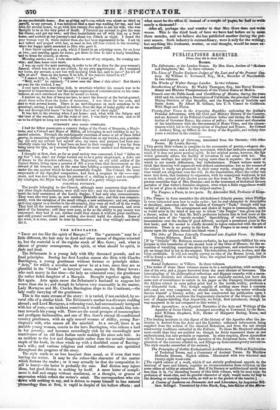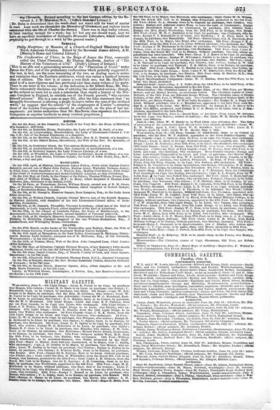PUBLICATIONS RECEIVED.
From June 414 to June 11th.
Booms.
The Ddbutante; or the London Season. By Mrs. Gore, Author. of " Mothers and Daughters," &c. In three volumes.
The Lives of Twelve Eminent Judges of the Last and of the Present Cbps- tarp. By 'William C. Townsend, Esq., MA., Recorder of Macclesfield. In two volumes.
The Works of Walter Savage Landon In'two volumes.
Recollections of Mexico. By Wieldy Thompson, Esq., late Envoy Extraor- dinary and Minister Plenipotentiary of the United States at Mexico. Travels over the Table-lands and Cordilleras of Mexico, during the years 1848 and 44; including a Description of California, the principal Cities arid Mining Districts of that Republic, and the Biographies of Iturbide and Santa Anna. By Albert M. Gilliam, late U. S. Consul to California. With Maps and Plates.
Twenty-four Years in the Argentine Republic • embracing the Author's Personal Adventures, with the Civil and Military History of the Country, and an Account of its Political Condition before and during the Adminis- tration of Governor Roses; his course of policy; the muses and character of his interference with the Government of Monte Video, and the circum- stances which led, to the interposition of England and France. By Colonel J. Anthony Bing, an Officer in the Army of the Republic, and twenty-four years a resident in the country.
Lays anti-Legends of Germany, translated from the German; with other Poems. By Louisa Harvey. [This pretty little volume is complete in the accessories of poetry,—elegant dic- tion, harmonious verse, and a flowing movement, which last indicates animation of mind, if it does not prove poetical spirit. In her original poems, however, the fair writer generally allows her facility of invention to run away with her. She sometimes overlays her subject by saying more than it requires : the result -of which is not merely diffuseness, but Indistinctness. Fluent writers seem to think that iteration will supersede well-defined condensation: but as the essence of the subject is really not presented in their many words, stopping short at any time would not altogether cure the era In the translations, where the writer was more tied down, this tendency to expansion, with its consequent weakness, is not so much felt; several of the shorter poems are free from it. The style of the fair poetess resembles that of Mrs. Hemans ; and lathe treatment of historical themes partakes of that writer's feminine elegance, even when a little ruggedness would not be out of place in relation to the subject-matter.] The Tongue; a Poem, in two parts. By Alexander Bell, Professor of Elocu- tion.
[The Tongue in form resembles the old-fashioned didactic poems, when Phillips in verse instructed men how to make cyder: but its real character is descriptive or desultory, somewhat after the fashion or Cowper's "Task," though with less variety of subject. The arrangement and choice of topics is commonplace, such as would arise in the mind of any one to whom "the Tongue" was given out for a theme • unless it be that Mr. Bell's profession induces him to look more at the oratorical uses of the "unruly member. Speechifying, of various kinds, with lamentations over the decline of good delivery, occupies a prominent place in the first book; and the second is chiefly devoted to topics connected with the art of elocution. There is no poetry in the book. The Tongue is an essay or rather a theme upon the subject, turned into blank verse.] The Odes of Horace Literally Translated into English. Verse. By Henry George Robinson. Book II. [If by "literally" Mr. Robinson means verbatim, he has scarcely fulfilled his own purpose in this translation of the second book of the Odes of Horace; for the ne- cessities of versifying sometimes drive him to paraphrase, and sometimes to sup- ply an image that is not in the original. The translation, however, is close, and the verse creditable. It will not exactly convey an idea of the Roman lyrist, but it will be found a useful aid to reading him; the original being printed opposite the translation.] Social Influences; or Villiers. In three volumes. [The writer of these three volumes seems to be a metaphysician, with metaphy- sics of his ■rivn, and a jargon borrowed from the most obscure of Germans. The intermingling of his philosophical reflections and flippant remarks with a narra- tive whose incidents and characters may have originally existed, but have the same sort of resemblance to nature in his pages as the trumpery illustrations of the Afghan retreat in some paltry print had to the terrific reality, produces a very distasteful book. Yet, though capable of nothing more than a common tale—and not very competent, we should think, to that—the writer evidently fancies himself a literary artist; and has constructed his publication upon a peculiar plan, which combines the fragmentary character of the Giaour with the sort of chapter-labelling that Ainsworth, we think, first introduced; though he was measured in its use compared to this writer.] Hosts Apostolicce; or a digested Narrative of the Acts and Writings of the Apostles of Jesus Christ. Arranged according to Townsend, bTthe Reve- rend William Shepherd, B.D., Rector of Margaret Boding, Essex, and Rural Dean.
[The leading incidents in this digest of the history of the Apostles after the AS- cension is derived from the Acts and the Epistles; collateral information being supplied from the notices of the classical historians, and from the not always trustworthy traditions embodied in the Fathers. To these Mr. Shepherd attaches more credit than they are entitled to; though he fairly represents them as not authenticated, but only probable or reported. In other respects, Hone Apostolicos will be found a clear and agreeable narrative of the Scriptural facts, with an ex- planation of the customs alluded to, and fillings-up from contemporary narratives. The style smacks somewhat of the sermon.] The Principles of Gothic Ecclesiastical Architecture. With an Explanation of Technical Terms, and a Centenary of Ancient Terms. By Matthew Holbeche Bloxam. Eighth edition. Illustrated with two hundred and twenty-eight wood-cats. [The eighth edition of a work, which if not strictly professional appeals to the amateur of taste and leisure, requires no recommendation from criticism on the score either of utility or attraction. But if its literary or architectural merit were less than it is, the exceeding beauty of this little volume, with its neat type, its profusion of wood-elite, and its general character of style would make its way to the drawing or morning room table, as well as to the pocket of the tourist.] A Course of Lectures on Dramatic Art and Literature by Augustus Wil- liam Schlegel. Translated by John Black, Esq., late Editor of the Mora-
*ay Chronicle. Revised according to the last German edition, by the Re- verend A. J. W. Mortison, M.A. (Bohn's Standard Library.)
LMr. Bohn is determined that the world shall not stand still for want of matter to read. Last week we chronicled the Memoirs if Grammont, and various tracts connected with the life of Charles the Second. There was in that bulky volume, at least reading enough for a week; but lot lest any one should want, here we have an excellent translation of Schlegers Dramatic Literature, which mild not profitably be got through in a week by the general reader.]
SERIALS.
Philip Musgrave; or Memoirs of a Church-of-England Missionary in the North American Colonies. Edited by the Reverend James Abbott, A.M. (Mnrray's Horne and Colonial Library.) The Confiscation of Ulster, in the Reign of James the First, commonly called the Ulster Plantation. By•Themas MacNevin, Author of "The History of the Volunteers of 1782." (Duffy:s Library of Ireland.) [This is an able and a painstaking account of the Plantation of Ulster" under jatnes the First, and of the preliminary confiscations which 'Probably suggested it. The last, in fact, are the more interesting of the two, as dealing more in action and enterprise than the Northern -settlement, which was rather a battle of lawyers than of soldiers. The view is of course a very Irish one; but Mr. MacNevin's mind is of a more vigorous and less provincial cast than many writers of his party. There is one taint in the volume: in the dedication to Sir Robert Kane, Mr. Mac- Nevin vehemently disclaims any idea of rektoring the confiscated estates; though, as the subject no more led to such a conclusion than would a history of the Nor- man Conquest in England, he reminds one of the French proverb, who excuses himself accuses." But in a note at page 231, after the false statement that "an incapable Government is allowing a people to starve before the eyes of the civilized world," he suggest. that *the estates of the shopkeepers of Lotidon"-meaning those of the London Companies-should be confiscated, on the plea of bad ma- nagement: yet better authorities than Mr. MacNevin cites represent the London Companies as superior landlords to many resident proprietors.]



























 Previous page
Previous page